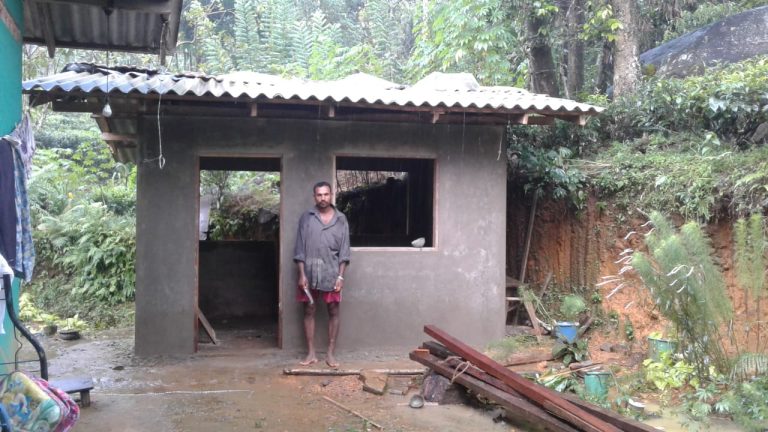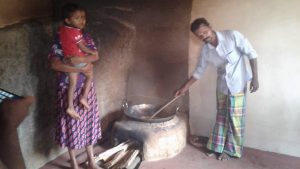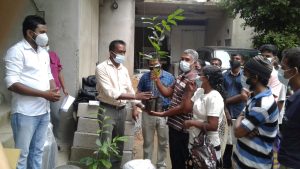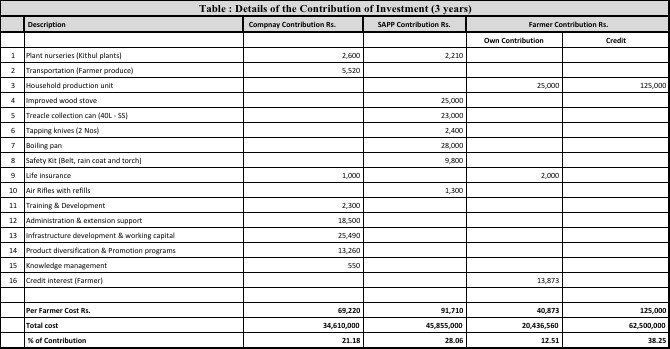Livelihood Development of Smallholder Kithul Farmers Under Producer-Public-Private Partnership (4P) Model.
Total Project Cost
RS. 163.4 Million
Locations of the Project
Rathnapura, Kegalle and Kandy districts
Number of Beneficiaries
500 Out Growers



Background of the Proposed Project
The kithul trees are grown throughout the island except the dry zone Districts. In the rest of the island, they are mostly found in the Rathnapura, Monaragala and Badulla Districts. There had been about 2.9 million trees, of which about half a million had been flowering trees while about 1.5 million are plants. Though the Kithul trees are common in Sri Lanka, only in Ratnapura and Kegalle districts, (in Sabaragamuwa Province), tapping and processing of kithul is popular as a domestic industry. The tappers in 2009 had numbered about 29,000. Specially, it can be seen that most of tappers from the low-income families are involved in Kithul treacle and jaggery producing industry, domestically, and that stands as their main income source. It remains as a popular domestic industry because it was one of the possible industries that could start without capital investment. Survey conducted on traditional Kithul treacle and jaggery industry reveals that 18,200 of 582,000 Kithul trees in Ratnapura district were utilized for Kithul treacle and jaggery production and 5,500 people in the district engage in the industry as tappers. In the past, in Sri Lanka, Kithul treacle and jaggery had been used as a substitute for cane sugar, and therefore, there was no competitive demand for such products. At present , due to socioeconomic and other reasons, consumption of Kithul product has gone up and therefore, there is a considerable demand. But it is reported that the current supply cannot satisfy the increasing demand. Since a kithul tree takes about 10-15 years to flower and become ready for tapping, by 2025, there should be about two million flowering trees. Hence, the number of tappers available for tapping the potential trees in the country is woefully inadequate and a further 50,000 people should be trained to meet the demand by that time. For this purpose, it is really impotent to strengthen the rural smallholder kithul tappers in a systematic manner to help them to upgrade the quality of their product and to create a sustainable market with a maximum price Project Goals Meaningful increase of economic benefits of kithul tappers through value addition in a sustainable manner with partnership building Project Objectives o To strengthen thirteen (13) farmers societies in selected districts for the sustainability of the partnership and provide technical training to beneficiaries with the support of relevant authorities. o To promote value addition among beneficiaries with the objective of enhancing their current income. o To enhance the quality and quantity of kithul based products through smallholder farmers o Encourage to expand the processing capacity of the company (promoter) to purchase more processed or semi processed products from beneficiaries and to promote the kithul industry in local as well as in global context through effective marketing campaign o To attract young farmers to the industry by introducing technology and relevant knowledge and to promote youth entrepreneurship by assisting young entrepreneurs through low interest loan scheme. o To cultivate 13,000 Kithul plants with the aim of sustaining the industry in the future.
Project Goals
Meaningful increase of economic benefits of kithul tappers through value addition in a sustainable manner with partnership building
Project Objectives
- To strengthen thirteen (13) farmers societies in selected districts for the sustainability of the partnership and provide technical training to beneficiaries with the support of relevant authorities.
- To promote value addition among beneficiaries with the objective of enhancing their current income.
- To enhance the quality and quantity of kithul based products through smallholder farmers
- Encourage to expand the processing capacity of the company (promoter) to purchase more processed or semi processed products from beneficiaries and to promote the kithul industry in local as well as in global context through effective marketing campaign
- To attract young farmers to the industry by introducing technology and relevant knowledge and to promote youth entrepreneurship by assisting young entrepreneurs through low interest loan scheme.
- To cultivate 13,000 Kithul plants with the aim of sustaining the industry in the future.
Investment Plan

Social Impact
• 13 strong farmer based societies will be functioning after 3 years of project implementation in three selected Districts.
• Expanded processing facility to cater the input of 500 Kithul farmers at the company level.
• Increased export orders with superior quality value added products through Kithul Sap.
• Double the income of beneficiaries after 3rd year of project implementation.
• Increased availability of Kithul based products in local as well as export market.
•13,000 plants established in project locations after 3rd year of project implementation.
• Developed 10 youth entrepreneurs in the kithul wood furniture industry.
Sustainability
The profitability and sustainability of the project lies to a great extent on the underlying support that will be given by Lanka Eco Products (Guarantee) Limited on training the farmers, expanding the processing capacity and arranging the collection network . The upliftment of the farmer, which in turn will benefit the Kithul producer and the Nation is SAPP’s ultimate aim. Lanka Eco Products (Guarantee) Limited work at farmer level has been observed in the field and its good rapport with relevant departments highlights the dedication towards the Industry as a whole and SAPP capability in successfully promoting and implementing a project of this nature in the past.
SAPP Regional Offices
UVA Province
Mr.Chitrasena VidanagamageRegional Project Coordinator
Tel: 071 8116152
Email: [email protected]
Address: SAPP Regional Office, Agrarian Service Center district office,Keppitipola road Badulla
Southern & Western Province
Regional Project Coordinator
Tel: 077 375 08 81
Email : [email protected]
Address: Smallholder Agribusiness Partnership Programme, No. 212/A, Nawala Road, Rajagiriya.
North Western Province
Email: [email protected]
Address: SAPP Regional Office, Provincial Department of Agriculture, Dambulla Road, Kurunegala.
North Central Province
Tel: 077 376 00 28
Email: [email protected]
Address: SAPP Regional Office,Provincial Department of Agriculture,2nd Floor, Kada 12, Anuradhapura
Central & Sabaragamuwa Province
Address: SAPP Regional Office, Department of Animal Production & Health, No.13, Peradeniya.


